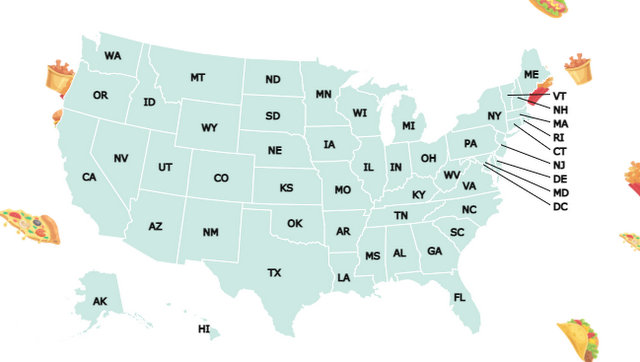Sacramento, CA…Live Fried, Die Young? There are many behaviors and habits many of us developed and continue, despite studies having proven that they have adverse health complications (leading to lower life expectancies), from overconsumption of ultraprocessed food and skimping on exercise. In fact, a recent study revealed that eating junk food contributes to cognitive decline. However, many Americans continue to eat fast food despite knowing that it could take years off their lives…
This was evidenced by a recent 3,222-person survey conducted by DrugGenius.com, a provider of reliable, evidence-based information about prescription medications. The survey asked respondents hypothetically, how many years of their lives they would be willing to forgo if it meant they could continue to eat unhealthily…
The results revealed that the average Californian would give up 5 years of their life to continue eating fast food! In fact, 51% also admitted that they flat-out ignore frequent studies that warn of the health risks of eating too much fast-food.
When these figures were analyzed in each state, the places in which people were willing to forgo the greatest number of years to keep eating unhealthy food were Hawaii, Montana, and North Dakota. People in these states would give up a whopping 12 years of their life to maintain this kind of diet. Comparatively, these figures were lowest in Alaska, Colorado, Maine, and Mississippi, where the average person would forgo ‘just’ 2 years of their life to keep making these dietary choices.
Interactive map showing the number of years people in each state are prepared to forgo, in order to continue eating fast food (click on ’embed’ to host map on your site).
Another study (Northeast Regional Center for Rural Development) found that American communities with a higher volume of fast-food restaurants have a shorter life expectancy, and research from The University of Michigan discovered that eating a hotdog costs you 36 minutes of your life, and a chicken wing can claim 3 minutes and 30 seconds. The good news, however, is that it’s also possible to add years onto your life by making more nutritious dietary choices and implementing healthier lifestyle habits. You can prolong your life by 26 minutes by snacking on a handful of nuts and seeds, while a serving of salmon can add 16 minutes. But when it comes to choosing between a hotdog, and a handful of nuts, many Americans still pick the hypothetical hotdog, despite knowing it could take years off their lives…
As it turned out, DrugGenius.com‘s survey also discovered that more than 1 in 4 (27%) people believe – wrongly – that moderate consumption of fast food has health benefits. And when asked what kind of fast food they believe has the greatest health benefits, 20% thought it was tacos or burritos (perhaps it’s the shredded lettuce garnish?); 8% believed it to be burgers and fries (potatoes are a vegetable, right?); 11% thought it was cheesy, processed meat-topped pizza, and 8% thought a bucket of fried chicken wings had the most health benefits. Overwhelmingly, 45% thought a foot-long sandwich had the most health benefits – maybe because some are loaded with healthy, fresh vegetables and served on wholewheat bread!
When asked about the battle of hangovers vs. hotdogs, a majority (60%) of respondents said if it came down to it and they had to choose between quitting alcohol or fast food for the rest of their life, they would rather give up alcohol.
One in three respondents also said they were more likely to take health supplements, as opposed to doing physical exercise to stay healthy. This perhaps makes correlated with another of the survey’s findings – that the average person said the last time they did any type of aerobic exercise was 3 months ago! And finally, the last time the average respondent said they checked their weight was also 3 months ago (presumably on the same day they did exercise?!).
‘It may seem like an impossible task to change up your lifestyle and dietary habits, however, once you begin making healthier substitutions and choices in one or two areas, it can also help you learn more about the nutritional information and components of different food sources,’ says Stacie Detmer of DrugGenius.com. ‘Although it’s less-than-likely that you’ll be able to completely change your habits overnight, learning more about this kind of information can help you make healthier choices overall, potentially adding years onto your life if managed effectively.’



